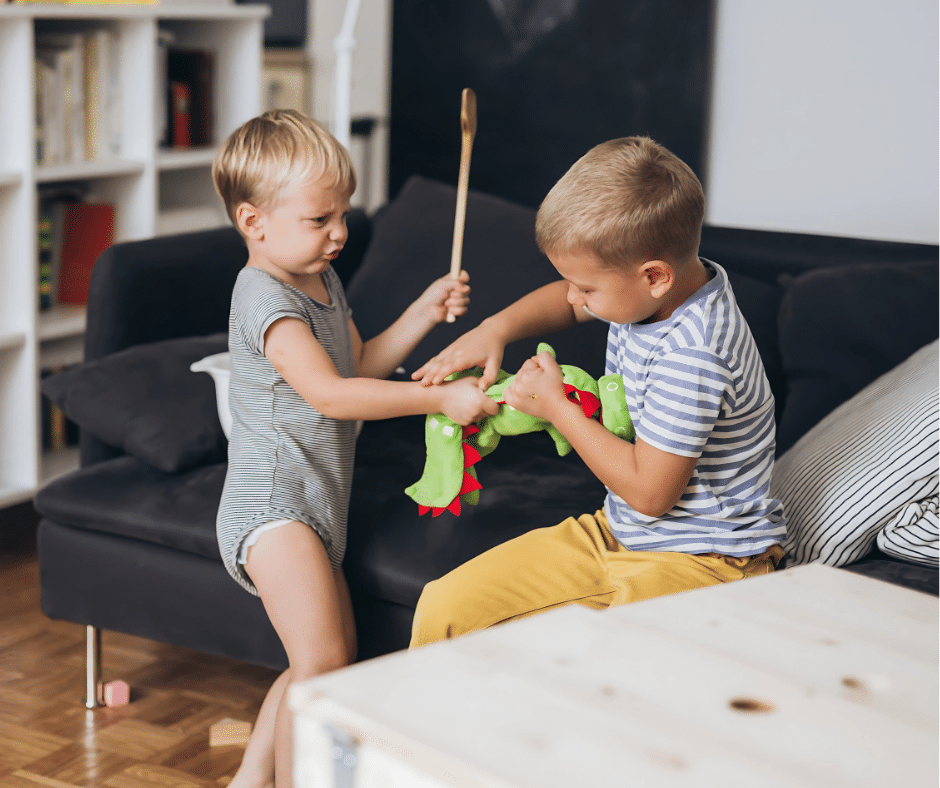When Siblings Fight
Those of us who grew up with siblings know how frustrating they could be. Now, as adults with children of our own, we’re watching our kids go through the same challenges that come with having siblings. As parents, we gain a new perspective on what our own parents endured—and a clearer understanding of just how trivial many of our childhood arguments really were (though at the time they were very important).
Sibling arguments often begin with a simple disagreement—whether it’s over whose toy belongs to whom, what game to play, or even who gets a particular spot on the couch. These small disputes can quickly escalate into yelling, name-calling, or even physical fights. Since young children are still learning to understand and manage their emotions, this kind of behavior is quite common-unfortunately.
Breaking Up The Fights
Step in early to prevent escalation. Try to stop the conflict before it leads to tears. This might mean physically separating your children or sending them to opposite sides of the room so they can calm down.
Stay calm yourself. While it might feel challenging in the moment, keeping your cool helps prevent the situation from escalating further. Save your energy for when things settle down, so you can focus on reinforcing positive behavior later.
Let them know you’ll discuss it later. In the heat of the moment, kids are often too upset to listen. Let them know the issue will be addressed once everyone has calmed down—even if that means waiting until the next day, especially with older children.
Enforce fair and consistent consequences. If your family uses consequences, apply them equally to all children involved. For instance, if the fight was over a toy, neither child should get to play with it afterward.
Tips for Handling Fights
These strategies can help defuse tension when sibling fights break out:
Be fair, not identical. Treat all children fairly, but understand that fairness doesn’t always mean treating them the same. Your 6 year old is more likely to understand what their expectations are than your 3 year old.
Avoid negative comparisons. Comments like, “You should know better—you’re older,” or “You’re always the troublemaker,” can increase resentment and make the situation worse. Focus on the behavior, not the child.
Understand the root cause. Figuring out why the fight started helps you respond more effectively. For instance, if one child pushes another to grab a toy, stepping in is important—otherwise, they may learn that aggression gets results. Observing your kids closely helps you spot patterns and respond appropriately.
Use clear family rules. Set simple, consistent expectations like “We speak kindly” or “Hands are for helping, not hurting.” Refer to these rules during conflicts and apply consequences consistently when they’re broken.
Have a plan in place. Know ahead of time how you’ll handle different types of conflicts. For smaller disagreements, guide your children to solve the issue themselves. For more serious issues—like physical fighting or repeated conflict after a solution was agreed upon—be ready to step in with consequences.
Keeping Your Emotions in Check
Staying calm is key when children are fighting. The way you react to the situation can and will impact how the situation unfolds. If the situation isn’t physically dangerous and doesn’t require your immediate intervention, take a moment to pause. Try stopping, taking a deep breath, and silently counting to 10 before you respond.
This short pause gives you a chance to regulate your own emotions, so you can approach the situation with a clearer head and a calmer tone. Often, those few seconds are enough to prevent anger or frustration from taking over. If you find that you’re still feeling overwhelmed after taking a moment, it’s perfectly okay to step away briefly—if it’s safe to do so. You might also ask another trusted adult to step in while you take a break to reset.
By managing your own emotions, you’re modeling self-control and emotional regulation—essential skills that children learn by example. Your ability to remain calm during conflict shows them that it’s not only possible to stay composed under stress, but also more effective. Remember, children are always observing how you respond in challenging moments. The way you handle stress becomes a powerful lesson in how they learn to navigate their own emotions and conflicts; which will help in the long run.

